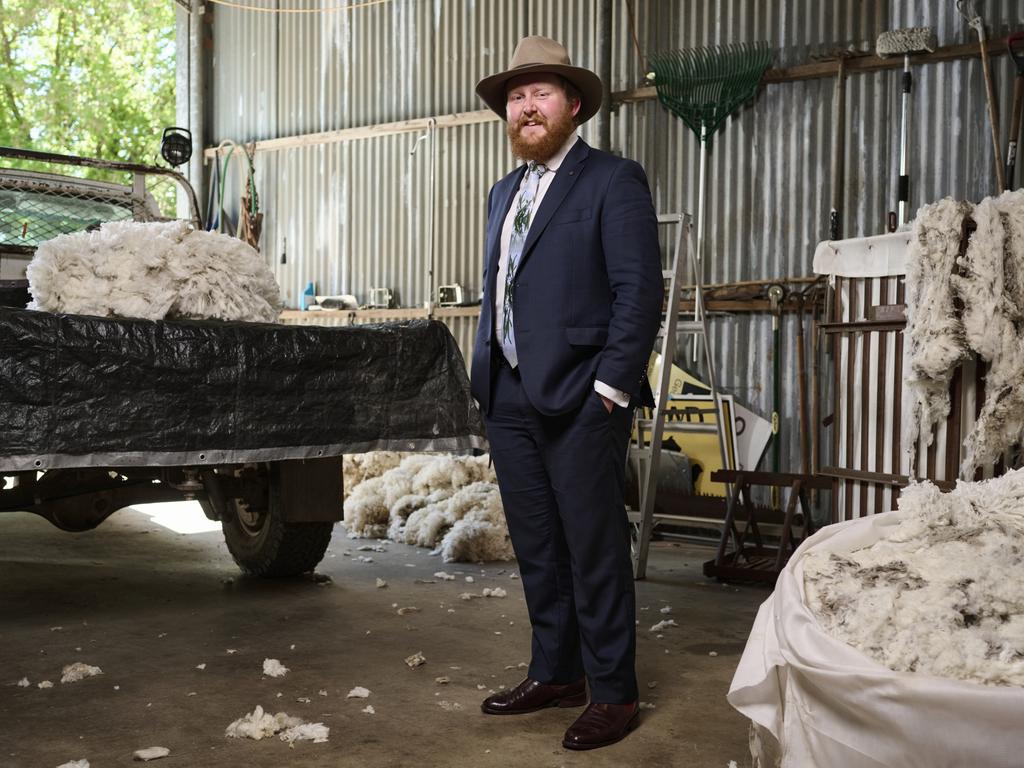Maker&Son’s whole new approach to marketing sofas pays off
After a life-changing setback, businessman Alex Willcock decided to do what he loved. The gamble paid off and now his luxurious, laidback sofas have a world-wide following.
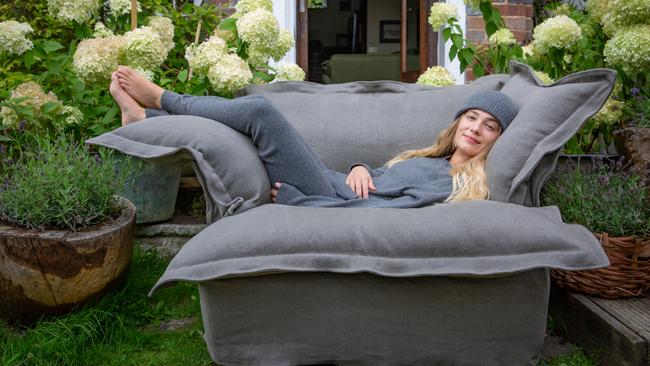
‘Don’t jump on the sofa’ is not something you will ever hear from UK-based Maker&Son CEO Alex Willcock. And as corroborated by the sofa brand’s Instagram account, the higher the better. Uploaded in time-lapse sequences, each post captures a charming cohort of family, friends and employees delightfully diving onto pillowy linen sofas. Set to classical soundtracks handpicked by Willcock – an Eton-educated music scholar and talented violinist who has played with chamber groups and orchestras – each post exudes the brand’s trademark British geniality; mannered and decorous with just the right amount of whimsy. Signing off ‘With love from Alex xx’ or ‘With Best Wishes to you’, the captions sometimes include product information, but more than likely they will reference obscure pre-19th century composers or some little-known opus.
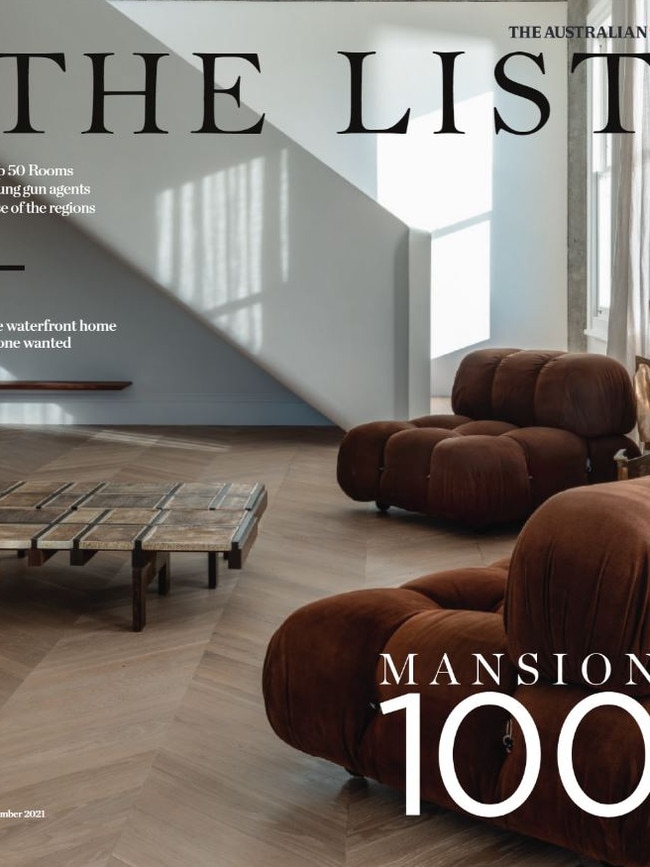
Today in The Australian: See The List of the nation’s Top 35 Mansions
Communication is so integral to the brand that Willcock says it was a letter he penned to himself that was the impetus for Maker&Son. In the aftermath of unexpectedly losing his successful data psychology business in 2015 and later, his marriage, a contemplative Willcock says he became deeply introspective.
“I really started questioning what I was doing with my life,” he says. “I was commuting to London, earning money and had a good career. The business was successful and there was potential for me to never work again, but circumstances changed and we lost a lot. In some ways, I felt like I lost 10 years of my life. I really reflected on that, and began to considere what it would be like if I just did what I loved doing, in the way that I loved doing it, with the people I loved. Felix was just a very natural part of that,” he says of his son and business partner, Felix Conran.
The concept was to sell a premium product direct-to-consumer online. Branded as a “furniture disruptor”, Maker&Son sells mid-sized sofas costing upwards of $8995 – an unusually high price for a Digitally Native Vertical Brand (DNVB) that was born and operates in the luxury goods space online.
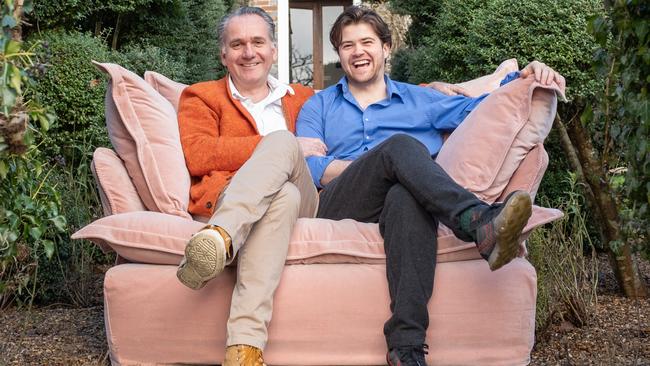
“Most DNVB’s sit at a price point that’s either tens or hundreds of dollars. Very few operate in the thousands, and only a handful in the tens of thousands like us. And even though it’s expensive, we don’t have retail costs so we put everything into the product itself,” says Willcock. Currently, the average transaction sits at approximately $18,000.
The company was launched in 2018, with the idea of producing high-quality but laid-back sofas with a focus on sustainability: natural latex, wool and cotton padding, ethically sourced feathers and jute webbing, all hand stitched with cotton thread. They are manufactured with sustainably sourced hardwood frames, there’s no Velcro or plastics, and loose, interchangeable covers allow for wash and wear to extend the lifespan of the fabric. For comfort, feather and down cushioning with handmade spring bases feature across all styles. But despite its good looks and positive attributes, surely a sofa is a try-before-you-buy item?
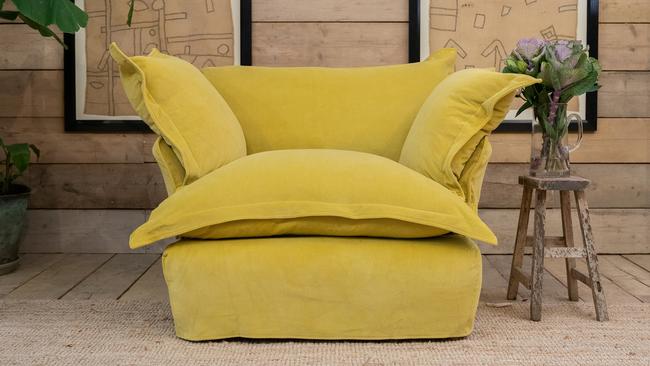
Willcock was fully aware of the gamble he was taking. “Everything you do as an entrepreneur, especially if you are doing something disruptive, involves risk,” he says. But in addition to his belief in the product, he was propelled by both experience and intuition. “As someone who has developed quite literally thousands of products over the years, you just get a feeling for something and as long as you stay true to the things that are important to you - your values and ways of working - and have a high degree of resilience, chances are that a lot of the time your feelings are more likely to guide you in the right direction.
“But there was just no way, considering how much the product actually cost us, that we could ever have afforded to open stores,” says Willcock, who spent years working in buying, branding and product development for his then father-in-law, the prolific designer and restaurateur Sir Terence Conran. “So much money goes into traditional retail for such a tiny proportion of the customers’ engagement with the product. So from the outset I was determined to come up with a luxury end product and do it digitally.”
MORE:The List: Top 35 Mansions
Maker&Son has adopted all the hallmarks of a DNVB model: a strong brand voice, environmental consciousnesses, transparent production and pricing, social media engagement, leveraging customer-backed data, storytelling, and a lean offering (although there are plans to slowly expand the range). However, to amplify their presence Willcock and Conran dipped their toes into offline with a small-scale, innovative alternative that involved putting the product in a van and driving it to people’s homes. “We had no cash, so buying a van was a massive risk and we really deliberated over it. But every single person who saw the product bought it,” he recalls.
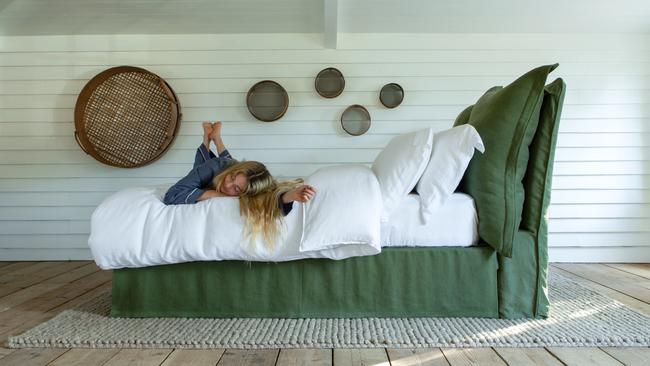
Spacious enough to transport an armchair or love seat but small enough to visit a workplace or home, each van was decked out like a regular room. “I wanted to create a sense of wonder. You see a car turning up and then bang! – inside is a room to this other world. It’s convenient, but you also get to sit in it and have a conversation at your own pace without distractions.”
Stringent marketing budgets have forced Willcock and Conran (Felix goes by his mother’s surname) to be agile. “When we launched, I had virtually nothing left,” says Willcock. “There was no way I could have afforded to pay anyone, so Felix and I took a very deep breath and bought a good quality camera. I literally took all the photos myself.” While born out of necessity, it was an approach that resonated – in Australia particularly.
With the range’s floppy, casual linen-look, it’s not surprising that one of the earliest orders was for a luxury guest house in Byron Bay. The very first, however, went to David Lawn, a former CEO of Lululemon Australasia, who went on to become an investor. In 2020, Maker&Son received equity from UK-based fund Magenta Partners.
While they were thrilled with the customer reception, manufacturing and shipping product from the UK around the globe didn’t sit well with Maker&Son’s sustainability principles. So Willcock flew to Melbourne and asked two friends for manufacturer recommendations, and both suggested the same one. “I went to see them and in and hour and a half I’d done a deal. And within six weeks were producing and shipping Maker&Son product directly out of our Melbourne workshops for the Asia Pacific market, using wool from an organic farm 30 minutes away.”
This model of production has since been implemented throughout the company to service respective markets, with local manufacturing currently in place across seven locations in Australia, the UK, Ireland, the US and New Zealand.
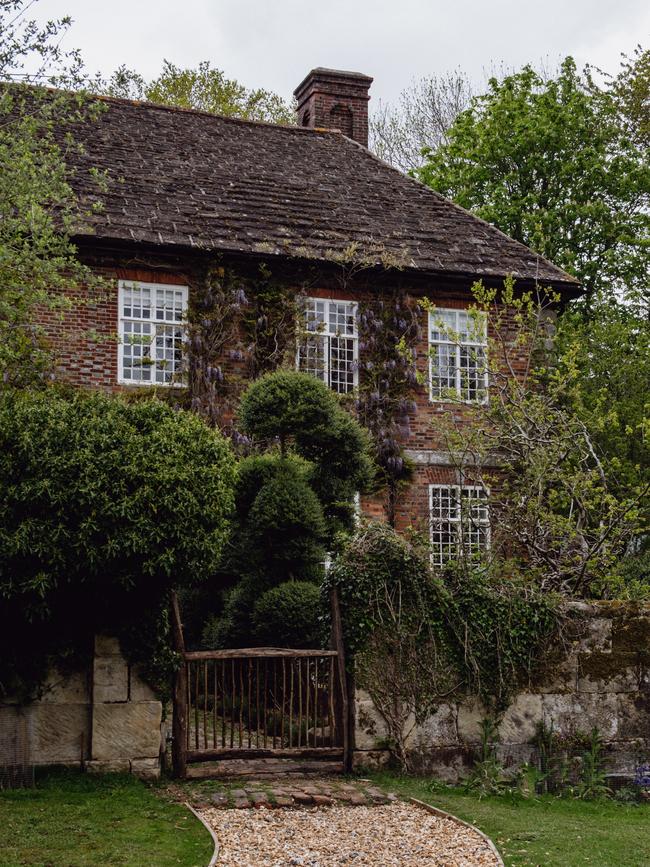
Maker&Son is headquartered at Kemps House, an idyllic 17th century country estate in West Sussex that is also Willcock’s home. A team of about 100 (including three company directors) work in and around the charming old farm outbuildings or at the warehouse 10 minutes up the road. The historic house is an integral part of the brand (it’s often referred to as the “third founder”) and the surrounding woodland forms the backdrop to shoots, with sofas casually positioned in the living room beside fireplaces or plonked in the middle of fields looking nonchalant and chic. Dreamy and bucolic, it’s an enviable workplace that Willcock insists is simply an authentic representation of the brand: “This is who we are, this is our life. We’re not going to manufacture anything, we’re just going to be ourselves.” There’s a convivial pastoral mood offset by a buoyant spirit, thanks to the involvement of young, fun friends of the family and Conran, 26, who makes the 40-minute commute from East London each day. In its name, product and location, Maker&Son invites the nostalgia of a family legacy company but with contemporary modes of communication.
The company’s visual identity is developed by Willcocks, who spent a career in digital marketing and branding, co-founding UK-based businesses with clients including Harrods, Selfridges and Lancome. However, some of his most formative professional experiences occurred during the time he spent in Australia during the nineties as general manager of Country Road’s Home Division. “I still can’t believe they gave me the job,” he says. “I was just 25 and was responsible for expanding product categories, opening department store concessions and new shops. But the thing about Steve [Bennett, founder of Country Road] was that he believed in people’s potential rather than just their experience. Working there changed my life in so many ways, and from all the things I know about companies now, it really was one of the most special places you could have worked; the energy, the creativity; there were people from all over the world.”
Even without social media and the passage of time, Willcock smaintains that his “Country Road days” were pivotal when it came to learning about marketing. “It was a world-leader in many ways, especially with its spectacular use of photography. I learnt the power of emotionally connecting with your customers back when they weren’t called your ‘audience’. I am very indebted to some of those photographers who, with their astonishing talent, demonstrated the sensitivity to be able to capture a spirit in the moment.”
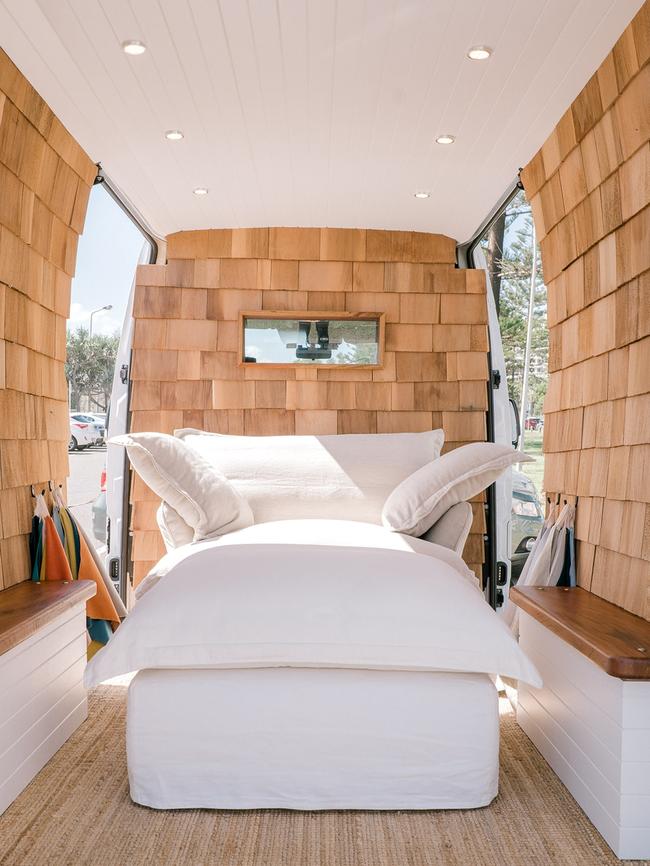
Melbourne is also where he lived with UK-born Sophie Conran and where Felix was born. While he has visited Australia regularly, Conran spent his childhood in England, where he recalls a life surrounded by music, food and design. “Most of my family have creative careers …so my appreciation for design was instilled from a young age,” he says. “My earliest memories are of my mother encouraging me to question objects around me: ‘Why do you like one thing over another?’ What makes this better than that? What would you do differently?’ When you are encouraged to question your surroundings, you stop taking everyday objects for granted.”
From the outset, Maker&Son’s strategy was to take a traditional product and bring it into the modern world. Using a sales funnel approach maximised by tech and data, it maintains and measures customer engagement through online chat, fabric sample requests, complimentary interior consulting and even an augmented reality app. The production process is entirely transparent, and Willcock and Conran (who also paints, draws and is working on a cookbook) have taken to recording personal video messages on WhatsApp, updating customers at the different stages of their order.
Although transactions are primarily online, the direct-to-consumer model has been getting some real world traction, with plans for 40 more Maker&Son mobile showrooms by the end of the year (currently there are 26 across the UK, Ireland, the US, Australia and New Zealand). There’s currently a small bricks and mortar offering by appointment at Kemps House and a showroom in New York. And Covid permitting, one is slated for Sydney this year. The company’s annual turnover is $45-50m globally (£24 million), of which Australia accounts for a third.
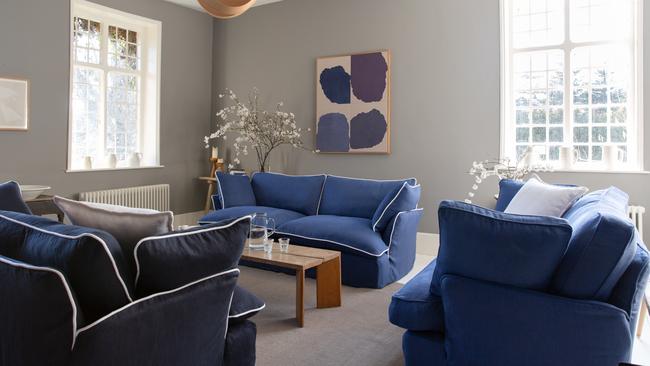
In April, Architectural Digest and Vogue Living featured the new home of music sensation Troye Sivan, who called his Maker&Son “Song” sofa “literally the most comfortable couch in the world”. The internet went wild over the David Flack-designed interiors, and while Willcock confesses that he didn’t know who the singer was, his teenage daughter couldn’t get over the fact that he had a Maker&Son sofa. “She called me up and said that she had idolised Troye Sivan since she was 11 and that Troye Sivan had one of our sofas and that Troye Sivan … she could not stop saying Troye Sivan. As far as she was concerned, my credibility just went through the roof.”


